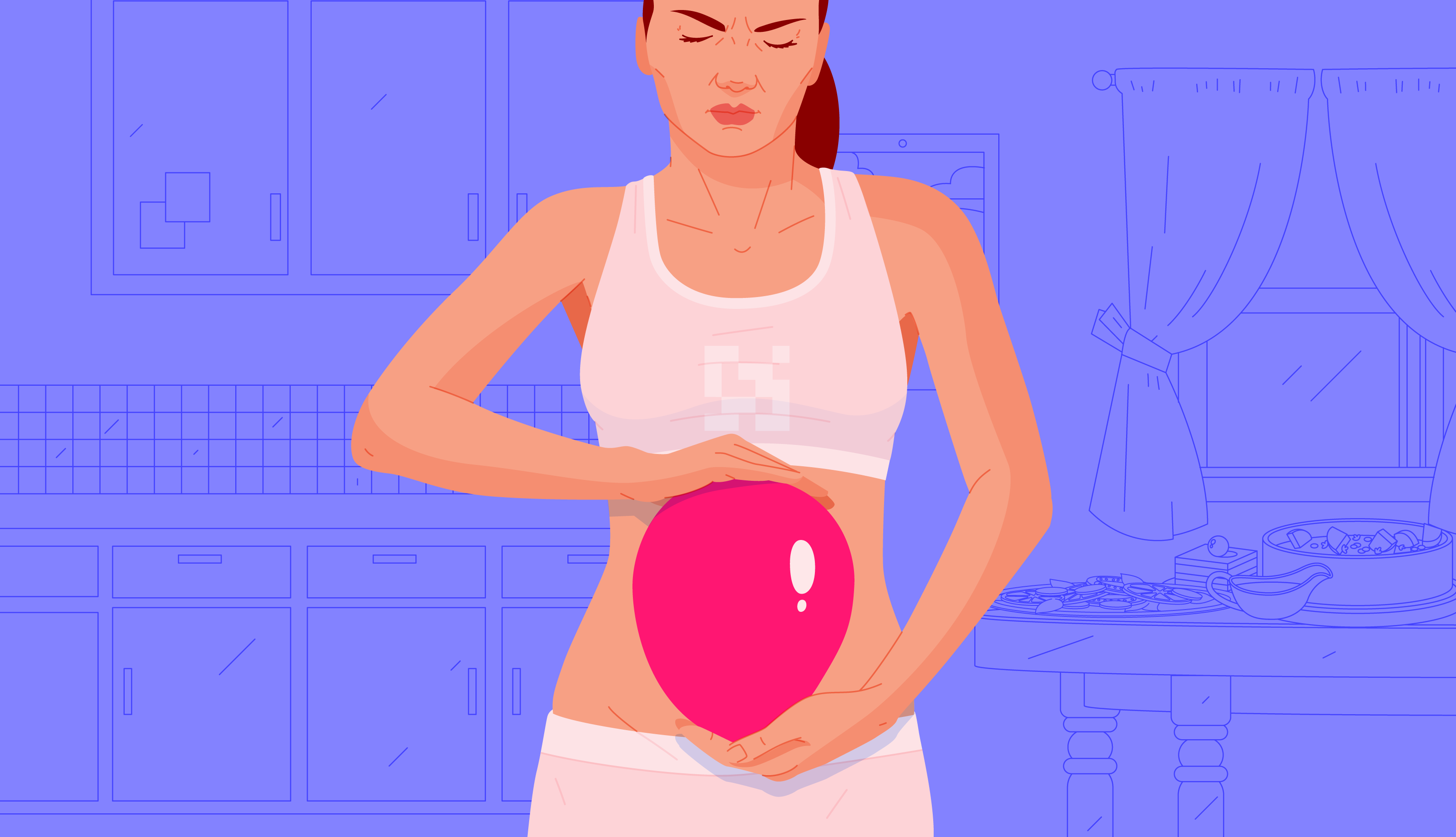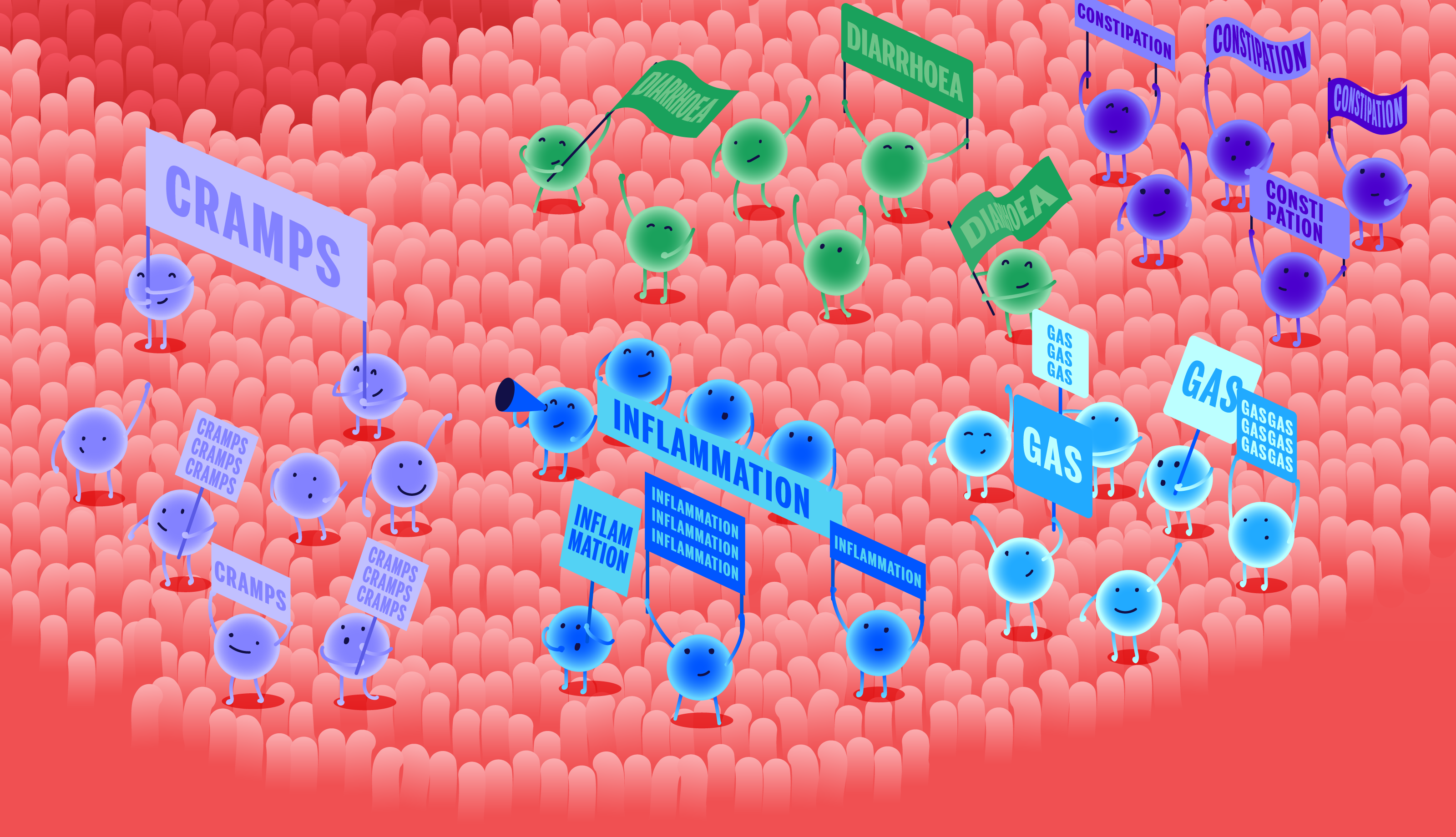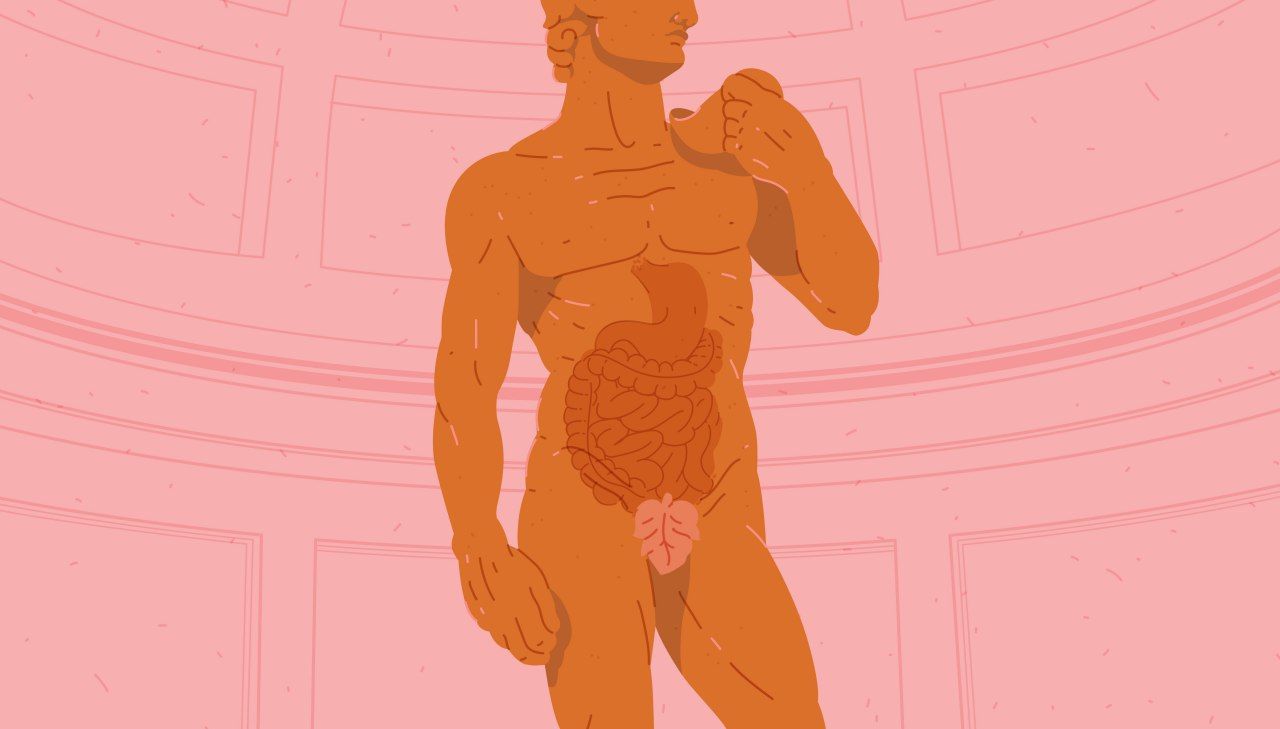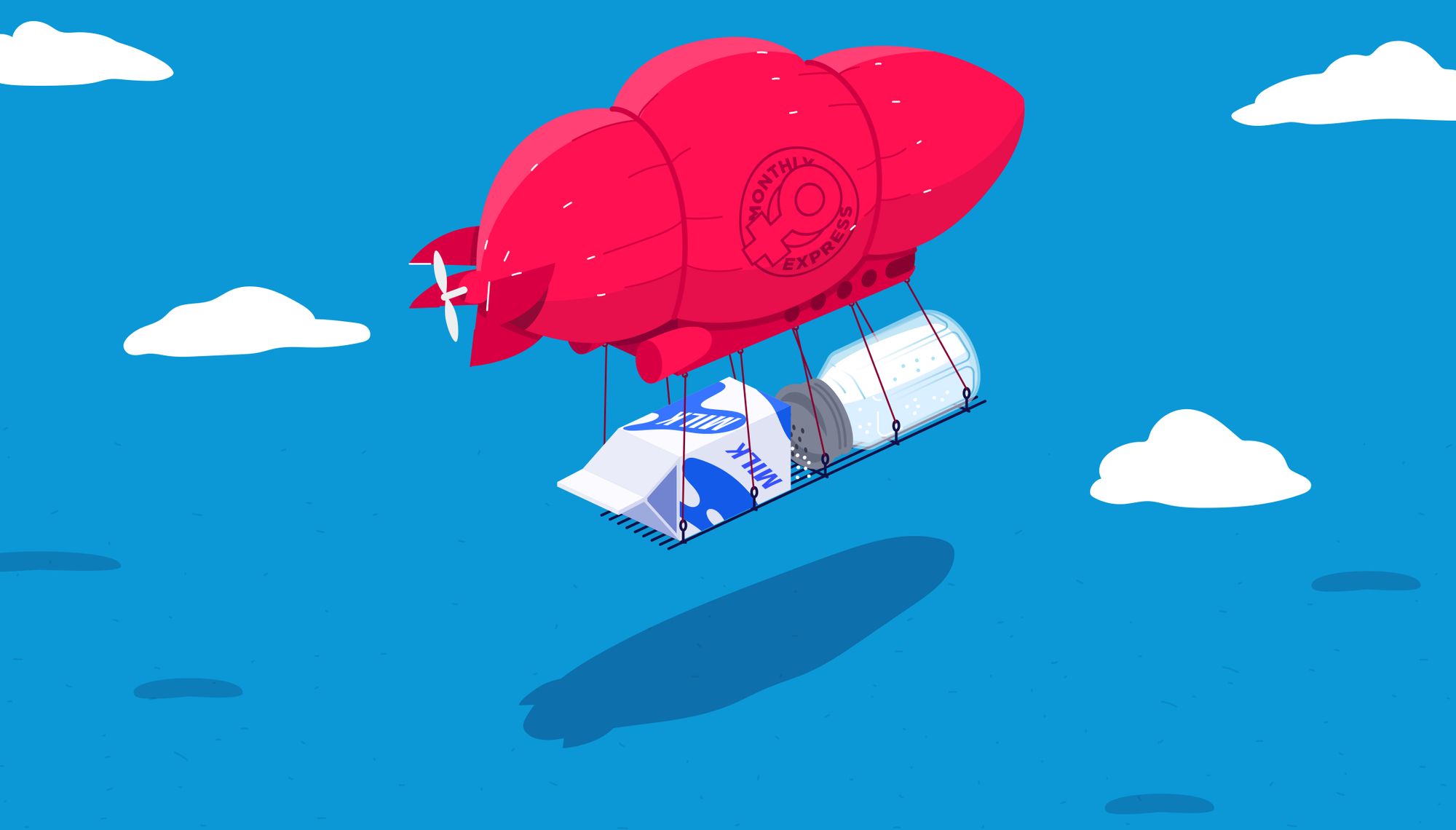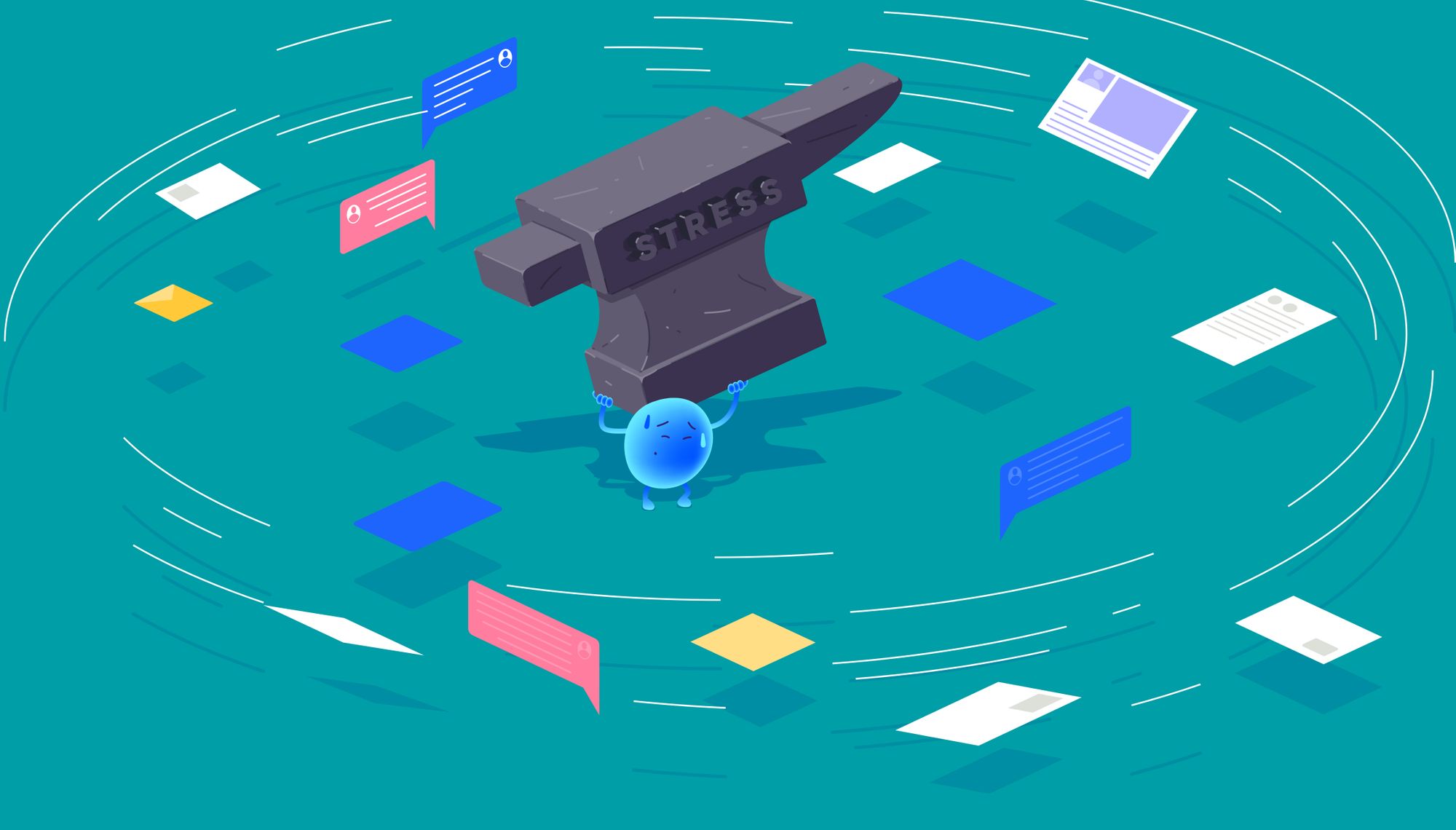Bloating is a common digestive complaint experienced by all ages and genders. We’re going to look at some of the everyday causes and what you can do to prevent the bloat.
Bloating can affect anyone. Lifestyle is often a major cause which, thankfully, means it can be prevented too. If your stomach expands after you eat or you’ve got so much gas that you’re too scared to light a candle, then what you’ve eaten could be the culprit.
Table of contents
- Feeling bloated after eating?
- What causes gas after eating?
- Identify your common triggers
- Stages of a low FODMAP diet
- How to stop bloating after eating
☝️DISCLAIMER☝️This article is for informational purposes only. It is not intended to constitute or be a substitute for professional medical advice, diagnosis, or treatment.
Bloating after eating
To feel bloated after eating is uncomfortable. The stomach feeling like it’s twice its normal size is one side effect alongside some other embarrassing symptoms.
Bloating has come to describe many different things, often it’s used to define a feeling of fullness in the stomach and being gassy. The stomach getting bigger is usually abdominal distension. Water retention sometimes falls under the umbrella term of bloating too.

In fact, out of a study involving 714 IBS patients who reported bloating as one of their symptoms, almost a quarter had no visible signs of a swollen abdomen. Essentially, that means people use the word bloating to describe a range of sensations, including cramping, gurgling stomachs, and nausea.
There are many causes. In some cases, it can be a symptom of an underlying condition like irritable bowel syndrome (IBS). Yet, for many, the problem of bloating can be solved by making some simple lifestyle changes.
What causes gas after eating?
Feeling like your belly is fit to burst or experiencing bad gas after eating is unpleasant, but understanding the cause could help to prevent it.
Digestive distress is an unpleasant symptom of bloating. Picture it: you’ve finished eating and your stomach feels full to bursting point, or you’ve got so much gas after eating anything that you don’t know what to do with yourself.
Although a little tooting here and there can be humorous, too much of it can be painful. In fact, severe symptoms can really take it out of us. For example, dealing with cramping and pain can lead to fatigue, greatly impacting on our personal and social lives.
If that wasn’t enough, excessive gas production from your rear end can be continuous, making it pretty difficult to go to work or socialise. Alternatively, the stench could leave you feeling horrified with yourself! But there could be several explanations for its occurrence.
☝️Does rice expand in your stomach? ☝️ No. If you cook your rice before eating it, it should be soft and chewy because it has absorbed all the moisture it can.
Dysbiosis
The colon is home to trillions of bacterial cells which make up the gut microbiome. These bacteria perform important tasks like breaking down fibre, producing beneficial metabolites like vitamins and short-chain fatty acids, as well as supporting your immune system.
Indeed, consuming high amounts of refined sugar and processed foods are not only bad for your overall health, but it limits the diversity of your gut microbiota while also encouraging the growth of bacteria that can make you gassy, leading to bloating, flatulence, and cramping.
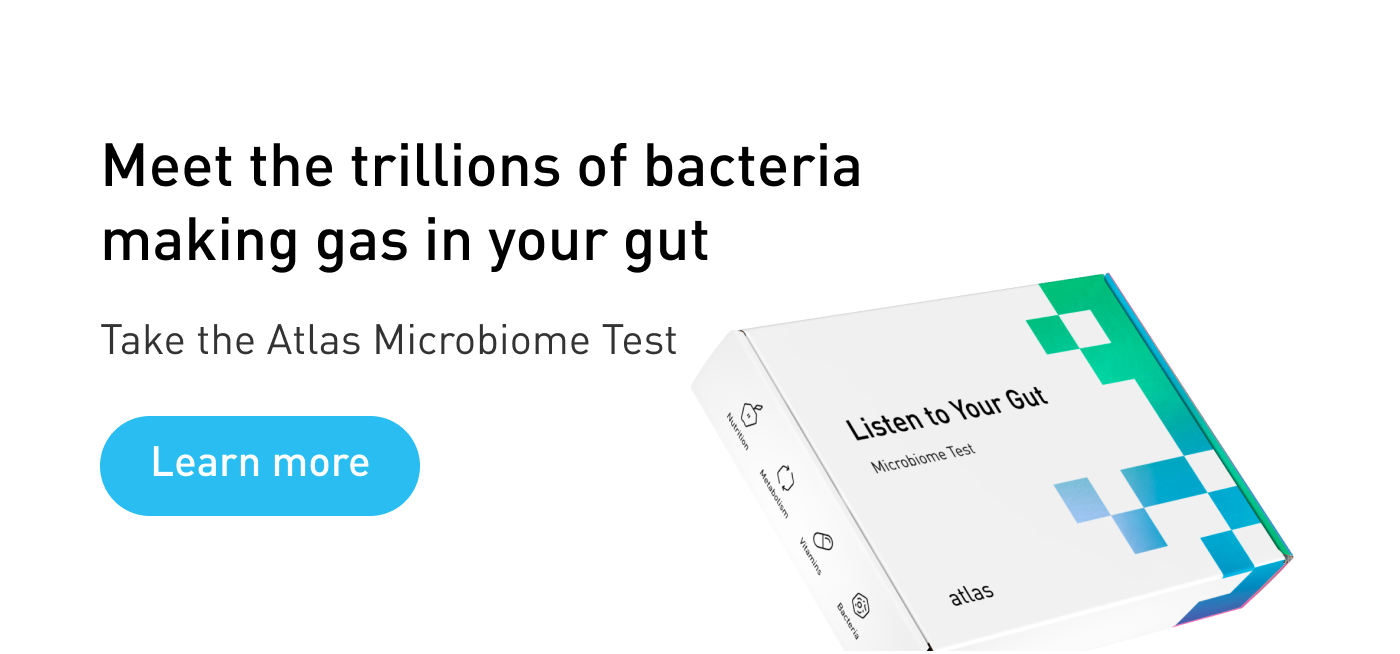
Medical conditions
If you’re wondering what causes bloating after eating, there are some medical reasons too. Small intestine bacterial overgrowth (SIBO) happens when there is excessive growth of bacteria in the small intestine. It can cause gas and bloating after eating, abdominal discomfort, and fatigue.

IBS is a chronic condition affecting the large intestine, but the exact cause of the illness is unknown. Abdominal pain is the most common complaint, followed by bloating. In one American study, over three quarters (76%) of IBS patients complained of bloating symptoms.
Leaky gut
When your gut lining is working properly, the barrier allows essential nutrients you need to pass through it and enter your bloodstream, and it stops larger molecules and opportunistic pathogens getting in.
However, if this barrier is weakened by a medical condition, poor diet, or dysbiosis, it can be described as leaky, resulting in inflammation and causing symptoms including bloating, gas, cramping, diarrhoea, and constipation.
Diet makes you gassy after eating
Feeling bloated after eating can be caused by certain foods for some people. Foods rich in fibre like whole grains, legumes, and some vegetables - although healthy - can lead to bloated bellies.
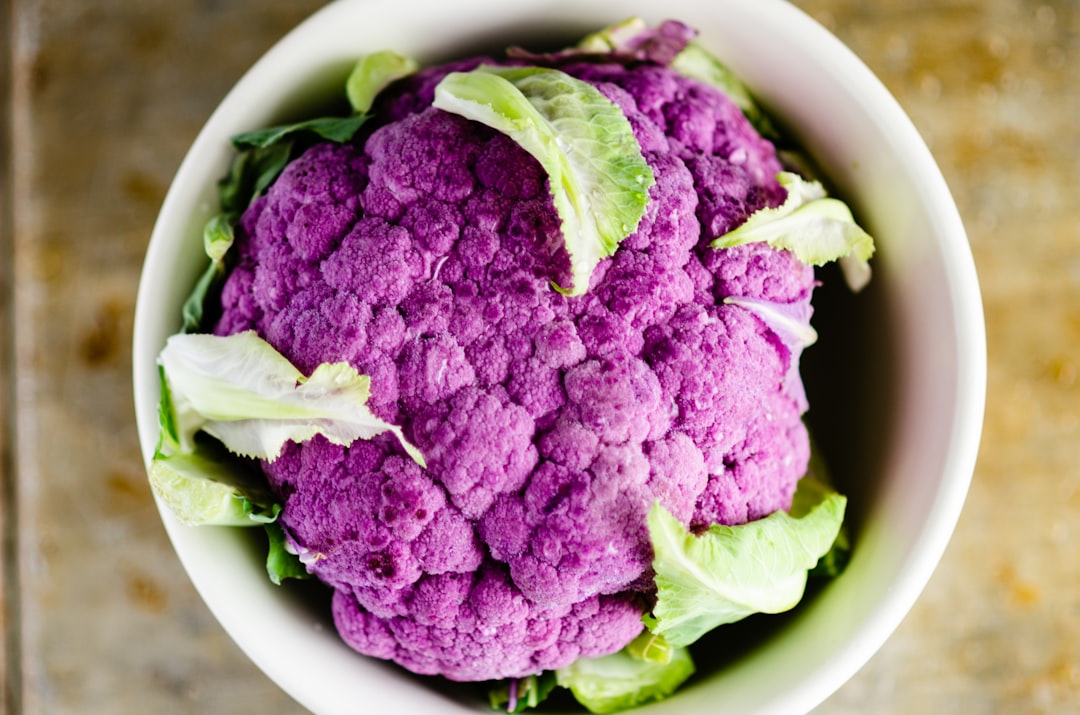
Although your gut bacteria are well equipped to break down the fibre in your diet to beneficial metabolites, the process can also lead to the production of gas. Suddenly increasing your fibre intake means you may also be greeted with some odoriferous flatulence, bloating, and some discomfort.
Salt, another major component of the Western diet, is a major contributor to bloating because it tells your body to hold onto water. Other things like taking in lots of air when you eat or drinking carbonated drinks increases the gas build-up in the body, making your belly feel like an inflated balloon.
Why do I bloat after eating?
If your stomach bloats after eating, identify your common bloating triggers so you can take steps to resolve the problem.
The first step to dealing with the issue of bloating is to establish the potential causes. And, it’s easier to do so than you might have imagined. Once you’ve found the source, you can begin to put an action plan in place and actively take steps to stop bloating and gas after eating.
Identify your common triggers
We are all unique, so what causes bloating in one person may not be the same in another. So, getting to know your body inside out is really important if you want to learn about what may be upsetting it and making you feel less human and more like a hot air balloon.
Common triggers of bloating:
- stress
- fizzy drinks
- diet
- lack of exercise
- eating too quickly
- dysbiosis
- IBS
- food intolerances
If you get gassy after eating anything, then you need to turn detective (think Sherlock Holmes), and a food diary is necessary. Simply make a note of everything you eat and drink alongside other important info like your exercise, medications, and how you feel after eating.
How to stop bloating after eating
If you’re looking for ways to stop the bloat after eating, check out these tips to stop that gas after every meal.
Get more fibre
The Western diet can be a major culprit in the belly bloat saga. Characterised by its high-fat and refined sugar content with little goodness from fibre, the Western lifestyle is not great for your health.
It takes longer for your body to process fat, which is why it can feel like your tummy is fit to burst after a large, fatty meal. Reducing your intake of processed, refined, and fried foods can help, and increasing your intake of fruit, veg, and whole grains if you’re not getting enough already can all help.
☝️TIP☝️Discover your personalised food recommendations to enhance your gut bacteria and add more fiber to your diet with the Atlas Microbiome Test .
Gentle exercise can speed up digestion
If you’re feeling up for it, take a gentle walk after eating to reduce bloating after meals. But bear in mind that gentle exercise is better than strenuous types, because intense physical activity shuts down your digestive activities and reroutes your energy towards the muscles.

Eat less fiber
If you’re already eating lots of fibrous foods or are thinking of participating in Veganuary, or are freaked out thinking you don’t eat enough, chill. There’s no need to be a hero and go mad with your fibre intake. In fact, it could do you more harm than good!
Fermented foods can help
If the balance of gut microbes is a little messed up, increasing your probiotic intake could help to restore your microbiome back to equilibrium. Foods that decrease bloating might include fermented examples, like kefir and yogurt containing natural probiotics (a source of live, beneficial bacteria).
Some research has shown that Bifidobacterium infantis could be helpful for IBS patients. However, other studies have shown that some probiotics, like those containing Lactobacillus, can help with IBS symptoms, but don’t necessarily reduce bloating.
Slow down: eating’s not a race
Eating is a marathon, not a sprint. Inhaling your food is not good if you want to avoid bloating after lunch. That’s because when you gulp down your food, you’re also taking in lots of air, resulting in lots of gas after eating. It can also result in belching.
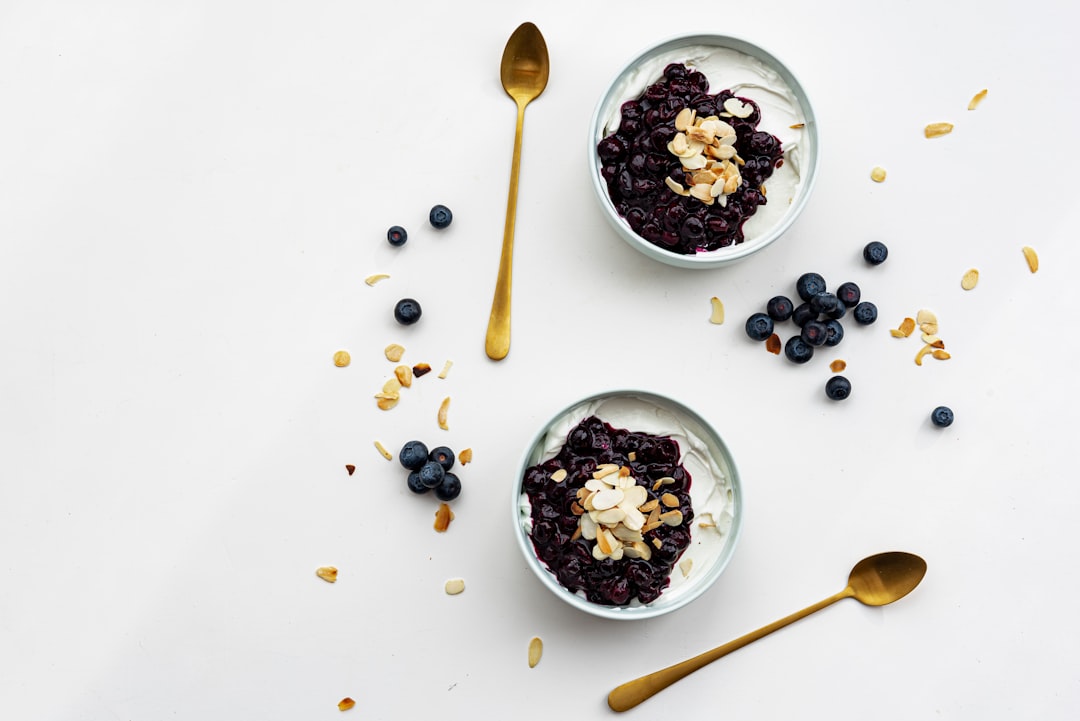
You can beat the bloat by eating slower and chewing your food. Not only will that reduce the air you’re taking in, but it can also help to make you feel fuller so you take in less unnecessary food. And that’s a win-win for your waistline.
Fizzy drinks expand your waistline
If you experience stomach bloating after eating very little, maybe it’s what you drink rather than what you eat. Fizzy or carbonated drinks cause carbon dioxide to build up in the body, inflating your stomach, resulting in gas immediately after eating.
The best drink to combat this is water. Just still water, not sparkling though. If, like many others, you’re not keen on the taste, try adding a little flavour like a slice of lemon or lime. These not only enhance the flavour of water, but won’t expand your tummy either.
Take it easy with the salt
Sodium is a major ingredient in the Western diet, and diets high in sodium are also known to cause bloating. Salt encourages the body to retain water, that’s why we feel thirsty after eating salty food. It can also alter the composition of the gut microbiome by decreasing the abundance of Lactobacillus, a probiotic bacterium.
The good news is reducing salt intake can relieve the symptoms of bloating, and it’s simple to do. Most sodium intake comes from processed foods and eating out, so try cooking at home and using herbs and spices to infuse your dishes with flavour.
Reduce stress at mealtimes
The low-FODMAP diet
Because food is often implicated as a trigger for gastrointestinal symptoms, a low FODMAP diet is sometimes used to control IBS effects. It stands for fermentable, oligosaccharides, disaccharides, monosaccharides, and polyols. These are the types of fermentable fibre which the body struggles to digest and cause discomfort when they are broken down by gut bacteria.

However, even though the internet is a powerful educational tool, you should consult a qualified health professional before embarking on a low-FODMAP diet, because changing your eating habits can affect your health, and even trigger disordered eating.
Unlike the internet, healthcare professionals use diagnostic tools to determine whether a low-FODMAP diet is suitable for you. The causes of digestive discomfort and complaints are complex, and you may require further tests to identify the cause of the issue.
The stages of a low-FODMAP diet
| Stage | What happens? |
|---|---|
| Restriction | Remove all FODMAP foods for several weeks to clear your system. |
| Reintroduction | One-by-one add high-FODMAP foods back into the diet, and monitor symptoms |
| Personalisation | Adjust FODMAP based on symptoms recorded during the reintroduction period. |
Take-aways: just remember this
Your body is unique and what causes you to bloat might not be the same as somebody else. If you want to beat the bloat, remember to:
- Get a good amount of fibre in your diet, but don’t be a hero.
- Switch fizzy drinks for still water flavoured with lemon juice.
- Don’t get your gut in a twist, avoid stressful situations.
- Get some probiotics in your diet with fermented food.
- Manage your salt intake by cooking at home.
- Slow down when you eat, there’s no need to rush.
- Gentle exercise after meals can help with digestion.
- If lifestyle changes don’t help, ask a health professional.
- Apiroz, F and Malagelada, J, R. Abdominal Bloating, 2005
- Brown, K et al. Diet-Induced Dysbiosis of the Intestinal Microbiota and the Effects on Immunity and Disease, 2012
- Chang, L et al. Sensation of Bloating and Visible Abdominal Distension in Patients With Irritable Bowel Syndrome, 2001
- Costa, R, J, S et al. Systematic Review: Exercise-Induced and Gastrointestinal Syndrome-Implications for Health and Intestinal Disease, 2017
- Dukowicz, A et al. Small Intestinal Bacterial Overgrowth, 2007
- Halmos, E, P et al. A Diet Low in FODMAPs Reduces Symptoms of Irritable Bowel Syndrome, 2014
- Peng, A, W et al. Effects of the DASH Diet and Sodium Intake on Bloating Results From the DASH-Sodium Trial, 2019
- Young Seo, A et al. Abdominal Bloating: Pathophysiology and Treatment, 2013

